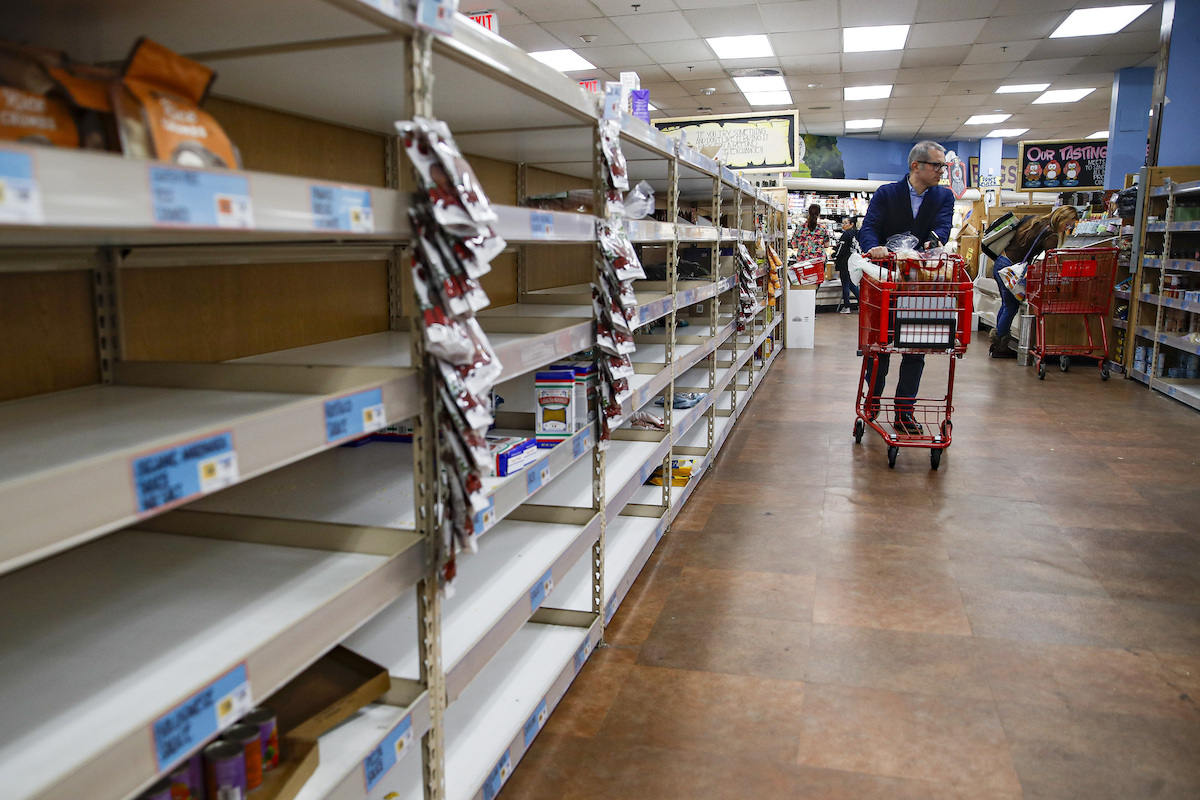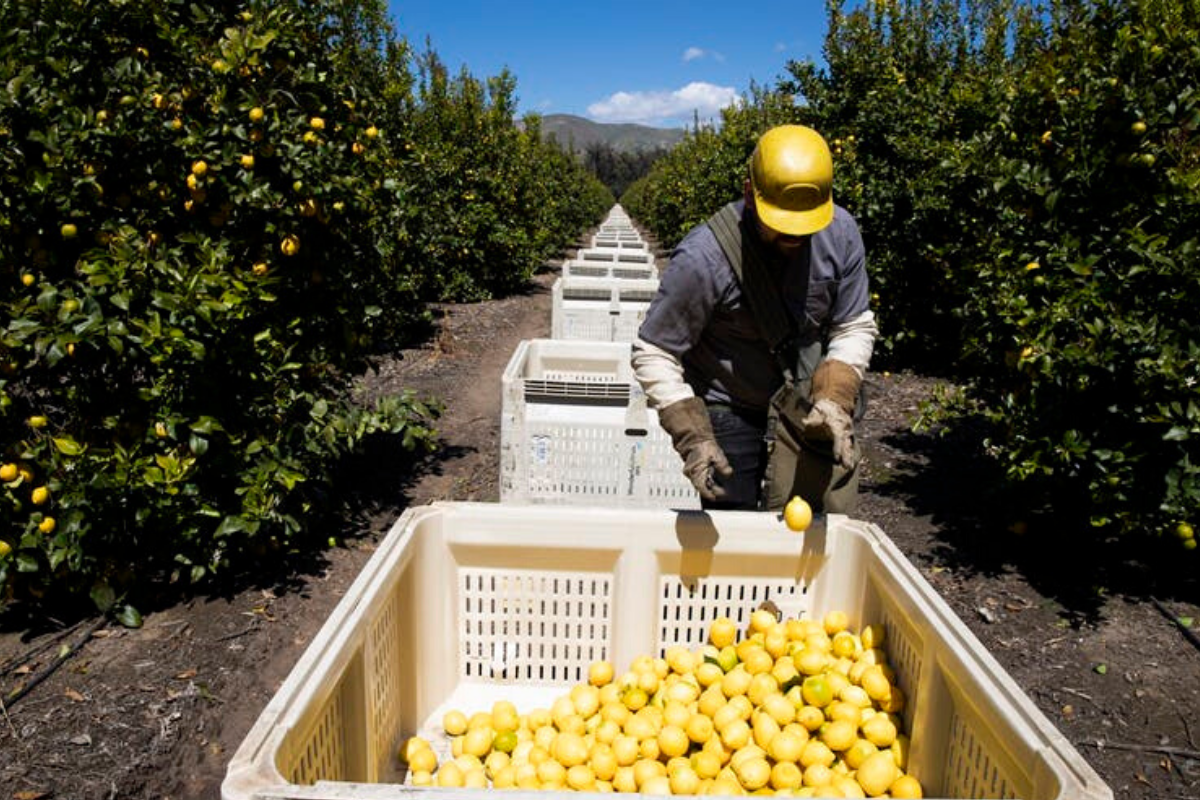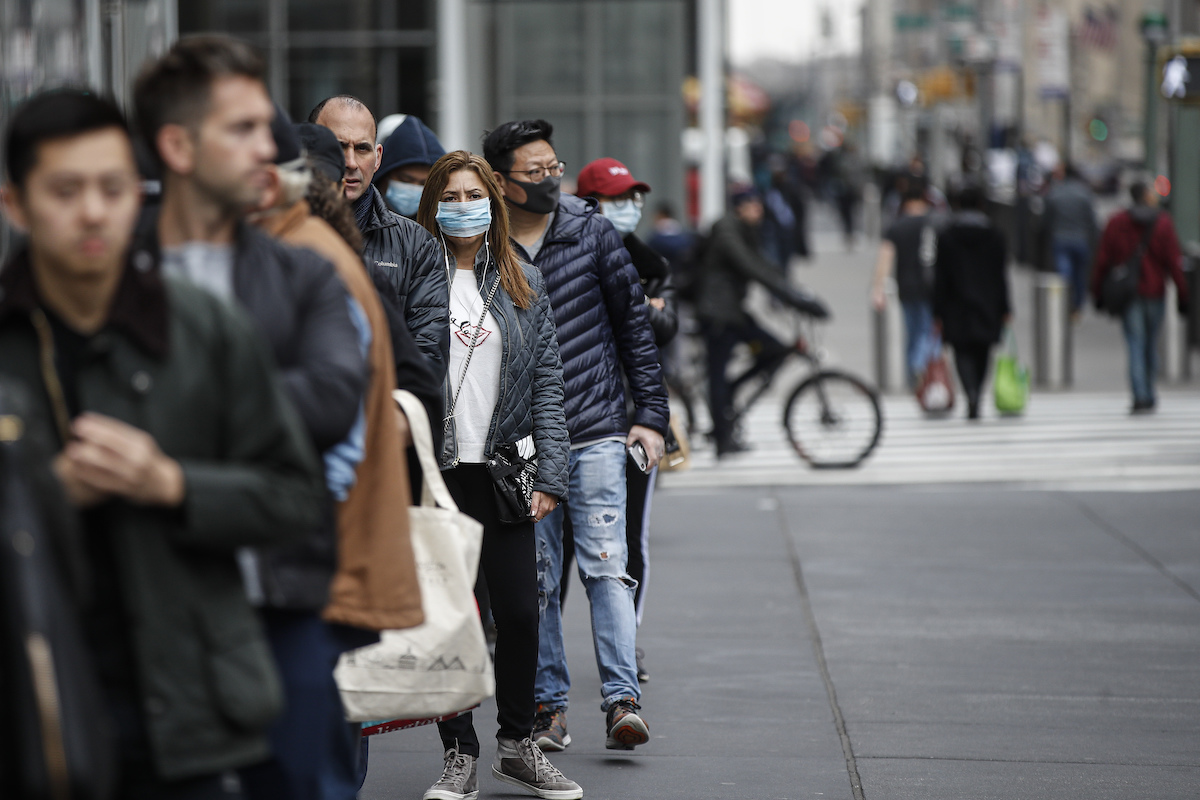

FILE – In this Friday, March 13, 2020 file photo, shoppers browse empty shelves at a supermarket in Larchmont, N.Y, amid panic-buying due to the coronavirus outbreak. (AP Photo/John Minchillo, File)
With peak growing season underway, foreign guest workers along with many in the immigrant community are putting themselves at risk to ensure grocery stores remain stocked with the foods we eat. The situation has become so critical that emergency measures were taken by the U.S. State Department to ease the bottleneck caused by coronavirus travel restrictions after the U.S. and Mexico agreed to block nonessential travel.
The move allows thousands of foreign guest workers to cross the Mexican border into the U.S. to work in fields from Florida to California. Under the new rules, most applicants will no longer have to undergo in-person interviews to receive the H-2A agricultural guest-worker permits.
The bottleneck was caused by the closing of U.S consulates in the border region in response to the coronavirus outbreak, making the in-person interview process impossible to administer. The waivers are to help allay fears of a labor shortage as the harvesting of major crops begin all over the country. Agricultural groups welcomed the move while still expressing fears the pandemic will leave them without the needed labor to harvest this year’s produce.
As thousands of guest workers rush to acquire guest-worker permits, many farm labor groups are pushing for new safety standards for thousands of workers. In addition to fighting against poor and overcrowded living conditions, indentured servitude, and near-constant raids by the authorities, farm labor organizations are now tasked with ensuring the safety of workers in the fields through the coronavirus outbreak.
The Farm Labor Organizing Committee (FLOC) has issued a set of safeguards addressing many of the concerns surrounding farmworkers and the coronavirus. The three main focal points are containment and safety, ensuring medical treatment, and ensuring financial support. By getting information to workers regarding “paid leave and unemployment insurance” and for “medical bills and leave that may be covered by worker’s compensation insurance,” it will help workers financially and encourage testing and treatment as soon as possible.


A farmworker picks lemons at an orchard in Mesa, California. (Brent Stirton/Getty Images)
The group is also calling on local, state, and federal government agencies to “cease all immigration apprehensions, raids, and release those in detention with monitoring who may have relatives that can facilitate stay at home policies.” A good portion of the agricultural industry also relies on undocumented workers as part of their workforce. Ending law enforcement operations in the farmworker community will also help boost worker confidence in seeking treatment for COVID-19 should workers begin to exhibit symptoms.
In addition to the safeguards, FLOC is offering a tip sheet to growers in California asking them to instruct workers who are sick to avoid work and “contact a medical provider or physician by phone before going to the medical office, clinic, or emergency room.”
The Lack of Care for Migrant Workers
Earlier this month, Los Angeles Mayor Eric Garcetti echoed the sentiments of Mayors all over the country when he asked citizens to stop hoarding food. “Supply chains are completely uninterrupted, and there’s no shortage of food,” Garcetti said. “There’s no reason to make a run on the supermarkets. Hoarding is hurting our most vulnerable Angelenos.”
The supply chains are uninterrupted. The question of whether they can withstand their labor forces being infected during a pandemic remains to be seen. Particularly when it comes to the food supply chain. It seems that of the biggest failures by our elected officials so far, not taking adequate measures to protect the food supply could prove to be the most disastrous.
In California, there could be as many as 400,000 of these vulnerable workers. Altogether, there are an estimated 2.5 million farmworkers on our nation’s farms and ranches, cultivating and harvesting crops, and raising and tending to livestock. According to the U.S. Department of Labor’s National Agricultural Worker’s Survey (NAWS), 73% of farm laborers are immigrants The same study showed approximately 47% of farmworkers are immigrants who lack proper authorization to work.
Undocumented farmworkers are the most vulnerable members of our fragile supply chain making their communities equally vulnerable. Without access to proper care and/or being struck with the fear of deportation just for seeking out medical care, this could prove disastrous for farmers all over the country. Currently, there isn’t much in place for these workers. Many will qualify for some of the benefits of the $2 Trillion stimulus package, but only if they have a work visa or are a U.S. citizen.
Some of these workers may not qualify despite having the proper paperwork because of the inclusion of the “must have a social security number” language into the stimulus. Depending on where some of these migrant workers are in the citizenship process will determine if they qualify for any benefits. Many more laborers will be left behind because they have been issued Individual Taxpayer Identification Numbers (ITIN) instead of Social Security Numbers (SSN)—a common practice for a large portion of undocumented workers.
Those who work and reside in the U.S. with an ITIN are taxpayers who do not benefit from the social programs they pay into. Even worse, they will not qualify for any relief that is in the stimulus package as they are considered undocumented. These critical workers that keep all of us fed are being afforded nothing despite being declared essential workers.
As groups continue to demand a plan of action to care for farmworkers, corporate farms are likely to adhere to some of the safeguards for their workers. What we should be asking is, just how far are they willing to go to care for their workers? Our food suppliers. It’s far too easy for farmers to toss immigrants aside and have their visas revoked to mitigate losses should an outbreak occur among farmworkers.
Farmers Don’t Follow the Law
An issue that rarely gets discussed in the United States is the safety of those who harvest our food. From the fields to meat processing plants, worker safety is rarely on the minds of most Americans. It’s a problem that hasn’t had the nation’s attention since Filipino farmworkers began the Delano Grape Strike in 1965. A strike organized by the Agricultural Workers Organizing Committee (AWOC) and supported by Cesar Chavez and Dolores Huerta’s National Farm Workers Association (NFWA) and their largely Mexican American/Chicano supporters.
Despite the successes of civil rights leaders such as Chavez, Huerta, Martin Luther King Jr., and so many others, America has not progressed much on the civil rights front and we have progressed even less when it comes to the health and safety of farmworkers. Now, with the coronavirus outbreak running at full bore, not only are America’s economic inequalities being exposed, but our fragile food supply chain is also dangerously close to being impacted by the virus. And that should alarm everyone.


In this Friday, March 20, 2020 file photo, customers wearing protective face masks to protect against the coronavirus, wait in line outside a Whole Foods supermarket on 6th Avenue, in New York. (AP Photo/John Minchillo, File)
In 2017, the National Institutes of Health (NIH) issued a report focusing on how discrimination shapes the way Latino farm workers are injured and how they seek treatment. The paper concludes that “discrimination and lack of worksite protections are implicated in farmworkers’ injury experiences, and suggests the need for policies that better safeguards vulnerable workers.”
Lack of proper healthcare and substandard living conditions will make the coronavirus tough to stop. In 2016, journalists found that Texas farmworkers were “forced to live in unventilated shipping containers and relieve themselves in the brush”. Despite the extensive housing laws for migrants in Texas, farmers rarely abide by them. In addition, they are rarely penalized for it. The same investigation found that state agencies had not fined a single farm for housing infractions since 2005.
Later that year, a report by the Midwest Center for Investigative Reporting, found that oversight of migrant housing in Illinois, Indiana, Iowa, Michigan, Missouri, Texas, and Wisconsin was “fractured and ineffective.” State inspectors routinely found mold, sewage, pest infestations, and faulty electrical wiring in farmworker housing. The report also indicates that these were rarely followed up on thus failing to provide assurances that conditions have improved.
Although employer-owned migrant housing is subject to state and federal regulations mandating minimum housing standards for temporary farm labor, farmworkers rarely complain out of fear of losing their job and their housing all at once. Farmers also get away with providing inhumane living conditions due to lax oversight and enforcement leaving farmworkers living and working in very close proximity to one another—sick or not.
Farmers can not, and will not, bear the burden of thousands of farmworkers getting sick. It is of vital importance for the government to prepare for the coronavirus reaching those who raise and harvest our food. Farmworkers are on the very front lines and they are ill-positioned to bear the brunt of this outbreak. Access to hospitals will likely be limited by the time COVID-19 reaches the fields due to overcrowding and America needs to be better prepared for when it does.
***
Arturo Tha Cuban is a front-line anti-racism activist, essayist and upcoming author who advocates for equality, justice and accountability. He tweets from @ExtremeArturo.



[…] greater focus is being placed on the demand for more seasonal farmworkers to keep American food shelves full during a global health pandemic, Latino Rebels founder Juilo Ricardo Varela recently had the […]